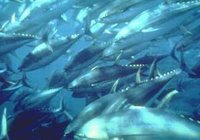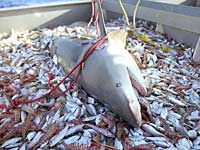 Tuna, Salmon, Cod. Imagine trying to explain to your grandchildren what they tasted like. This grim scenario was laid out last week in a groundbreaking study published in the world’s most prestigious research journal, Science.
Tuna, Salmon, Cod. Imagine trying to explain to your grandchildren what they tasted like. This grim scenario was laid out last week in a groundbreaking study published in the world’s most prestigious research journal, Science. Dr. Boris Worm from Dalhousie University led the investigation, which predicts a near complete collapse of ocean ecosystems by 2048. While the scale of this catastrophe seems right out of science fiction, the implications are very real.
Scientists looked at records around the world and throughout history to get a picture of where the world’s fish stocks have been and where they are going. The projected line of steady decline hits bottom at 2048, the year Dr. Worm predicts the world’s oceans will largely be populated only by toxic algae.
This apocalyptic future is the twin prodigy of ever more efficient fishing technology, coupled with incompetent and shortsighted government policy. Far from leading the world in solving this problem, Canada is one of the worst offenders and our story is a telling study on how the world ended up in this mess.
For years, Ottawa has consistently opposed restrictions on the use of dragger technology, a widely used fishing method that is so wasteful and destructive that our fishless descendants may well marvel at our collective stupidity.
Dragger boats do exactly that, dragging a net weighing several thousand pounds across the ocean floor, with predictable and devastating impacts on sensitive bottom habitat. The net can be large enough to swallow a 747, and anything swept up by this maw is long dead by the time it is hauled up on deck.
 “By-catch” is the quaint euphemism used by both industry and government to describe the enormous volumes of unwanted marine life dumped overboard, which can make up over 90% of the catch. It is akin to picking apples by first cutting down the tree.
“By-catch” is the quaint euphemism used by both industry and government to describe the enormous volumes of unwanted marine life dumped overboard, which can make up over 90% of the catch. It is akin to picking apples by first cutting down the tree. Ottawa recently joined our traditional fishing foes, Spain and Iceland, to block a proposed international moratorium on draggers on the high seas. Canadian fishermen do almost no dragging in international waters, so why would our government collude with countries we have in the past called “fish pirates” in blocking the protection of international fish stocks? Even George Bush supports this UN sponsored effort.
Documents obtained through access to information reveal that Fisheries and Oceans Canada (DFO) is apparently worried that such a prohibition might undermine their ability to allow the continued scouring of the ocean floor within Canadian waters.
This latest incident illustrates a culture of incompetence within DFO that almost defies comprehension. Having presided over the obliteration of our once-legendary cod stocks, this moribund department then allowed west coast salmon stocks to be fished close to extinction.
The response to this self-created problem was to create yet another, when it became department policy to aggressively promote net-pen aquaculture, now implicated in the massive infection of wild fish with parasites from these so-called “salmon farms”.
The case study of a wealthy, developed country such as Canada destroying our own fisheries resources through shortsighted motives and sheer stupidity has been repeated around the world. Fishing in international waters, where virtually no laws apply or are enforced, poses an even more daunting challenge.
The challenge now facing the world is essentially one of morality. This is the first time in history that we have the ability to catch virtually every fish in the ocean. Because we can, does that mean we will? It seems that morality has become essential not only for our own survival, but for the survival of most other life now sharing the planet with its new childish gods.
While time is short to save the world’s oceans, there is much we can do - if that is our choice.
Marine protected areas that are off-limits to commercial fishing have been shown to be highly effective at restoring ecosystems and repopulating adjacent areas.
Selective commercial fishing methods that do not destroy bottom habitat are not only less wasteful, but produce higher quality fish and provide more employment than dragger boats.
Certain forms of aquaculture such as catfish, trout and shellfish are not dependent on fishmeal as food, and can buy us some time to restore global ocean ecosystems.
Lastly, we need bold and principled leadership, starting at home. Incredibly, some of the same DFO bureaucrats that presided over the collapse of the cod are not only still in positions of power, they have since been promoted. This department is long overdue for a complete overhaul and many of these individuals should quite simply be fired – if not frogmarched to the curb. There is no time to waste being polite.
The scientists at Dalhousie deserve our gratitude for so clearly and convincingly showing where past and present practices are leading us. Let us hope we have the courage to change that path before it is too late.
Mitchell Anderson is a freelance writer living in Vancouver. This piece ran nowhere.
No comments:
Post a Comment